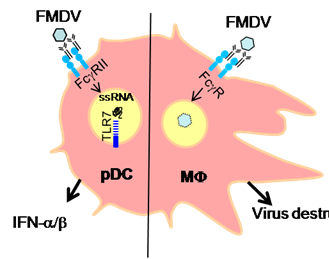 |
de | fr | en Druckansicht ![]()
3R-Project 113-08
Generic in-vitro evaluation assay for immunological correlates of protection to replace animal challenge infections
Artur Summerfield and Kenneth McCullough
Institute of Virology and Immunoprophylaxis (IVI), 3147 Mittelhäusern, Switzerland
kenneth.mccullough@ivi.admin.ch, artur.summerfield@ivi.admin.ch
Keywords: live stock; vaccination; infectious diseases; reduction; replacement; diagnostic approaches: vaccines
Duration: 3 years Project Completion: 2012
Background and Aim
Vaccination against foot-and-mouth disease (FMD) represents an essential element in controlling and combating outbreaks, which would otherwise have disastrous consequences. This is pertinent to regions in large parts of the developing world in which the FMD virus (FMDV) is endemic, as well as during an epidemic in FMDV free areas such as Europe. Nevertheless, successful vaccination against FMDV requires selection of the appropriately matching vaccine strain providing protection against a particular circulating field virus. This problem originates from the existence of seven known serotypes of FMDV, with which high antigenic variation of virus is observed. In addition, subtypical antigenic variation within a serotype is under constant evolutionary change due to the high mutation rate of FMDV. For these reasons, continuous vaccine testing and modification in the light of recent antigenic changes to the virus is required. Currently, vaccines are tested and selected using vaccination-challenge experiments in cattle. Such procedures are not only extremely expensive, but are also environmentally and ethically problematic, considering the severe animal suffering associated with disease development, and the requirement that all animals be slaughtered at the end of the experimentation.
Accordingly, the proposed solution is to develop realisable and robust in-vitro alternatives to such challenge infection tests. To this end, the present project integrates with the EU project FMD-DISCONVAC, from which the necessary samples will be obtained. Through this integration with the FMD-DISCONVAC project, we will be fulfilling the objectives of the EU call KBBE-2008-1-3-02: To substitute vaccine potency tests in animals by assays enabling a correlation of in-vitro tests based on immunological principles of antibody-based effector immune responses operating in vivo.
Although vaccine-induced protection can be predicted when high levels of virus neutralising antibodies are induced, this does not apply for vaccinates with relatively low levels of antibodies. So far, no alternative tests applicable to such sera have been developed and systematically applied to vaccine testing. Thus, the approach selected will go beyond virus neutralization tests, and also enable the functional analysis of non-neutralizing antibodies with respect to FMDV destruction and the induction of antiviral activity. Developed tests will have the potential of serving as improved correlates of protection against homologous or closely related FMDV vaccine strains. In addition, the tests have the potential to identify correlates of heterologous protection induced by vaccination.
Method and Results
Based on immunological evidence obtained from previous work, we are developing in-vitro screening assays based on the relationship between protection and the avidity of specific antibody for binding to the pathogen in question. We are evaluating the relationship between protection and the capacity of a serum to promote Fc receptor-mediated phagocytosis of FMDV immune complexes by macrophages and dendritic cells in terms of virus destructionn, and Fc receptor-mediated IFN-alpha and cytokine responses in plasmacytoid dendritic cells (see Figure 1).

Figure 1: Immunological background: FcR-mediated anti-FMDV responses induced in plasmacytoid dendritic cells (pDC) and macrophages (MF) as examples of antibody-mediated effector functions independent of direct virus neutralization.
In various cellular system, to test the influence of immune complexes obtained from vaccinated cattle and pigs were established. These include an assay measuring enhanced infection of bovine monocyte-derived dendritic cells by immune complexed-FMDV and for the porcine system enhanced IFN-alpha responses by plasmacytoid DC. Our results demonstrate a high sensitivity of both assays and show that opsonising antibodies possess a broad cross-reactivity against various FMDV isolates within one serotype and in some cases even across serotypes.
A main conclusion from was that opsonizing activity was clearly much broader than neutralizing activity suggesting that non-neutralizing IgG could also complex with FMDV to infect bovine MoDC or activate pDC.
To systematically investigate the relationship of opsonising antibodies with protection using a large panel of sera, we also have established a reporter system to measure opsonizing antibodies against FMDV. This is based on bovine FcRII (CD32) expressing murine RAW 264.7 macrophage cells. The principle of this test is that the RAW 264.7 cells are resistant to FMDV infection in the absence of antibodies but get infected and die when the virus is complexed with antibodies. Our results demonstrate that this test is highly sensitive, similar to the test using bovine MoDC, and has potential as an additional measurement to determine immunological correlates of protections.
Conclusions and Relevance for 3R
The experimental systems established now permits the quantification of opsonizing antibodies at a very high sensitivity. We are even able to detect reactivity across serotypes which was unexpected considering that there is no cross-protection between serotypes. We are now testing a larger collection of sera to determine the relationship of opsonizing antibodies to protection and to conclude on the applicability of this test to measure vaccine quality without challenge infection.
References
Lannes N., Python S. and Summerfield A. (2012) Interplay of foot-and-mouth disease virus, antibodies and plasmacytoid dendritic cells: virus opsonization under non-neutralizing conditions results in enhanced interferon-alpha responses. Veterinary Research 2012, 43:64, doi:10.1186/1297-9716-43-64.
| Letzte Änderung: 12.10.2018 |